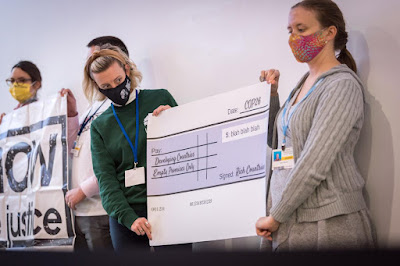This post is a reflection on the discussions at COP26 and the future of my blog. I take a step back from looking solely at water and agriculture in Africa to look at the broader context of policies to address the growing threats of climate change.
A word on COP26
COP26 discussions by-passed environmental loss and damage, instead focusing on climate finance and ‘western’ policy, failing to holistically address the future of agricultural systems. Perhaps a greater input on sustainable food systems from those on the frontline would have resulted in stronger policy, with more positive outcomes and a sustainable plan of action. Instead, voices, input and knowledge of the global south, indigenous communities and women were not included in the discussions of provisioning top-down adaptation measures. The conference had little mention of non-economic environmental loss and damage. This creates a disconnect that the implementation of measures such as mitigation of land degradation, habitat loss, and struggling food systems have from community lived experiences.
When considering just allocation of fundings I am skeptical, and from recent climate protests, it seems like I'm not the only one (figure 1). Just six years ago, at COP21, commitments were made by developed countries to mobilise $100 billion annually in climate finance for the Global South by 2020. Yet, why am I not surprised to read that such plans have fallen short. In the instance where the money was available, history has shown the cash is unlikely to actually reach those on the front line. In fact, just 1.7% of climate finance reached small holder farmers; nowhere near enough out of the billions required to mitigate and build resilience in farming practises and supply change. COP26 was a chance for this to change, but after broken promise after broken promise, I cannot help but feel unconvinced. Only when I start to see words turn into action and money turn to progress do I believe climate policies and financing small-holder farmers in Africa will begin to see long-term success.
 | |
|
We are at the breaking point. The world leaders need to step up to the challenge and give the local communities most vulnerable to environmental change a seat at the table.
Coming up...
Through writing this blog I intend to grow an understanding of water, agriculture and development in Africa and to do this I must look at both the challenges and the management techniques the continent has in place. So far, I have focused on the challenges facing East Africa, looking at Ghana, Ethiopia, and Kenya. Going forward I look to investigate the innovative solutions of these nations to combat the battles of the past and to mitigate the challenges of the future. I look to cover agroforestry systems and small-scale irrigation as ways to reform agricultural practises in Africa. Stay tuned to discover more.
It was really interesting to read your reflections on COP26, Summer!
ReplyDeleteI see you mentioned that there have been shortcomings since COP21 to mobilise the annual $100 billion in climate finance by 2020. Do you know happen to know how much has been mobilised? And whether any similar commitments or revisions were made at COP26?
Hi Emma, thank you for your comment!
DeleteA recent article released by Nature, outlines that in 2019 developed countries contributed $80 billion in climate finance, an increase from $78 billion in 2018. However, the official figures for 2020 have not yet been released and although we know countries have mobilised less than the pledged $100 billion it is suspected that covid-19 will have caused a wider decrease than expected.
In terms of similar commitments made at COP26, countries have come forward to reaffirm their commitment to contribute $100 billion annually until 2025 with the EU pledging an extra $5 billion by 2027.
I strongly recommend checking out this article
https://www.nature.com/articles/d41586-021-02846-3 to gain a deeper understanding of the broken climate finance promise of 2020 and also ways to fix it.
Really enjoyed reading this reflection post Summer! I like how you decided to take a step back from your previous case studies, take a breather and clearly outline where you want to take this blog in the future. It was also really creative to link this reflection to COP26 and your own disappointed feelings towards it, especially with the legacy of empty promises from previous years. I look forward to reading about the innovative solutions you mentioned!
ReplyDeleteHi Elena, thank you for your kind words! I saw that you also shared your perspective on COP26 and I am pleased we share the same ideas!
DeleteHi Summer! In my blog on gender, I also acknowledged the lack of female voices to help guide top-down adaptation measures. In the overlap between gender and food, this is pertinent, considering how women are predominantly involved in the agricultural sector, while men dominate fish and livestock. However, the agricultural sector is likely to be severely impacted by climate change, rendering women a highly vulnerable group. Their inclusion in decision-making processes is crucial, to ensure solutions are appropriate to their positionality and needs.
ReplyDeleteHey Stephanie! I read your the post you are referring to and I found it very insightful. I couldn't agree more!
DeleteI enjoyed reading your personal opinion on COP26 and are very much agree with your opinion that indeed, COP26 was a chance for world leaders to give those facing the most extreme environmental challenges a seat at the table. However, reflecting on previous environmental accords this is rarely the case with little action resulting.
ReplyDelete